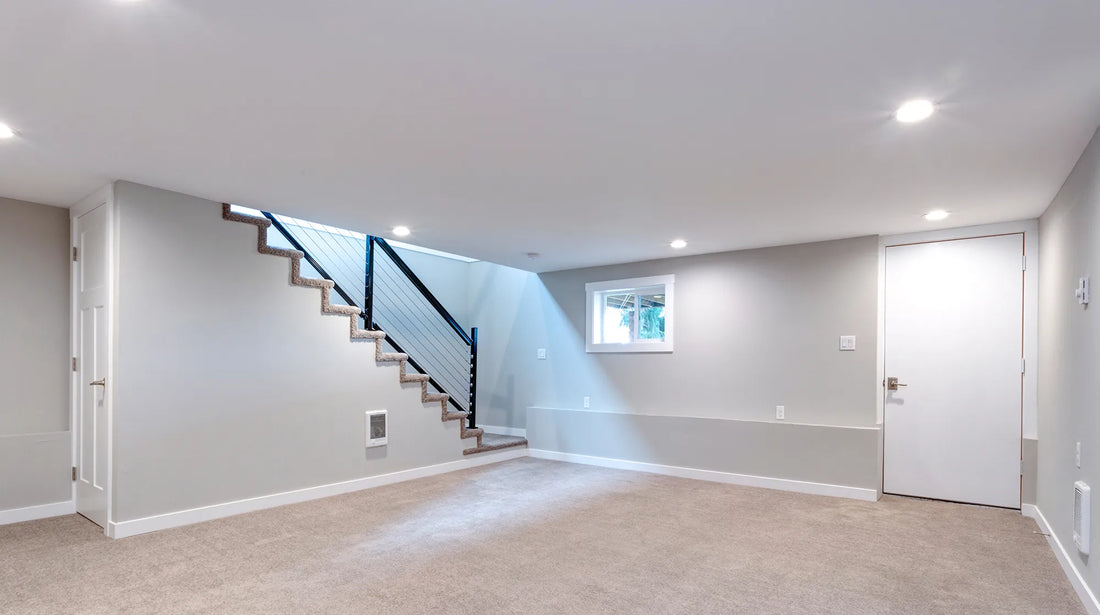We have a list of the best flooring for basements that you can refer to if you're planning to install new flooring for that area. Basements typically have poured concrete floors, which are solid, flat, and long-lasting. Nevertheless, if you want to remodel your basement (referred to as basement finishing), you will probably want to know the best flooring for basements in order to make the new area more attractive, more comfortable, and easier to maintain. It is good to know that you have other selections of flooring for basements that you can choose from. However, flooring for basement conditions differs from those upstairs. It is important to understand that these differences apply not only to flooring choices but also to the installation process.
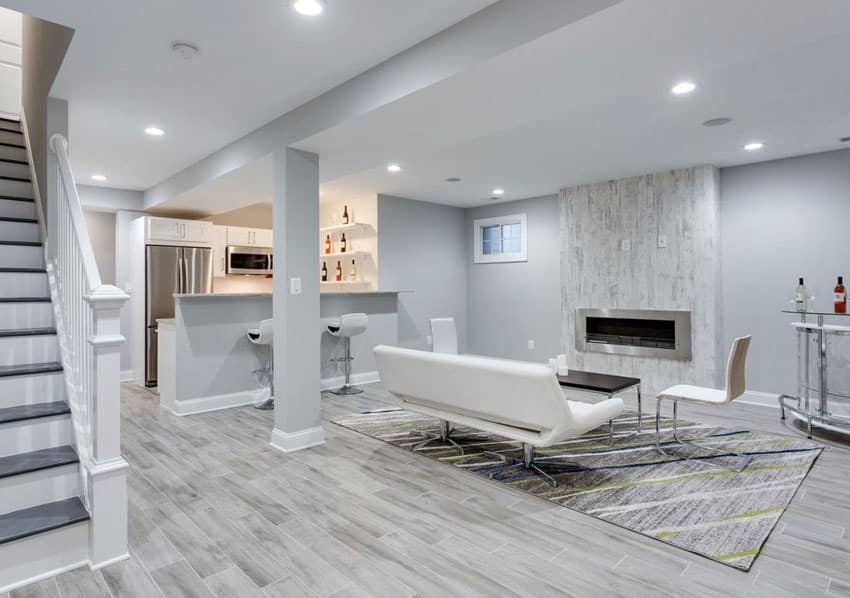
Photo: Designing Ideas
The Qualities of Best Flooring for Basement
When it comes to living spaces, whether new or old, you should always start at the bottom and work up. There are limited flooring options for basements due to moisture. Here are the best qualities of flooring for your basement. As you learn, there are many ways to make your basement an awesome area.
Flooring for Basement: The Rigidity
It is important to consider moisture when choosing basement flooring. Groundwater and pipes running through the walls and ceiling of the basement are constantly supplying moisture. A plumbing accident or heavy rains can also lead to water entering the area. As a result, basement flooring rules differ from those of the rest of the house. Concrete and tiles are better than carpets because they do not absorb moisture and are not as vulnerable to moisture damage.
Flooring for Basement: Inorganic
Organic material can become mouldy and rot away over time, while inorganic material cannot. As a result, an unpleasant odour could fill the basement. Despite being a tough material, solid hardwood is still biodegradable. A vinyl floor, for example, or a ceramic tile does not disintegrate when wet.
Flooring for Basement: Fewer Layers
The surface of a single-layer floor dries faster than one that is multilayered. One of the most common types of monolithic floors is concrete. Due to its hardness and inorganic makeup, it is also unaffected by water, since it has no multiple layers to trap water.
Flooring for Basement: Elevated Subfloor
There are some basement flooring types that require an elevated underlayment to provide a more stable foundation. The sleeper system can be chosen either through a traditional system or through a subfloor system.
What Are The Best Flooring for Basements?
The flooring in basements differs from the flooring in other parts of the house. Any basement floor covering should be waterproofed and strong enough to support the entire home.
Flooring for Basements: Vinyl Flooring
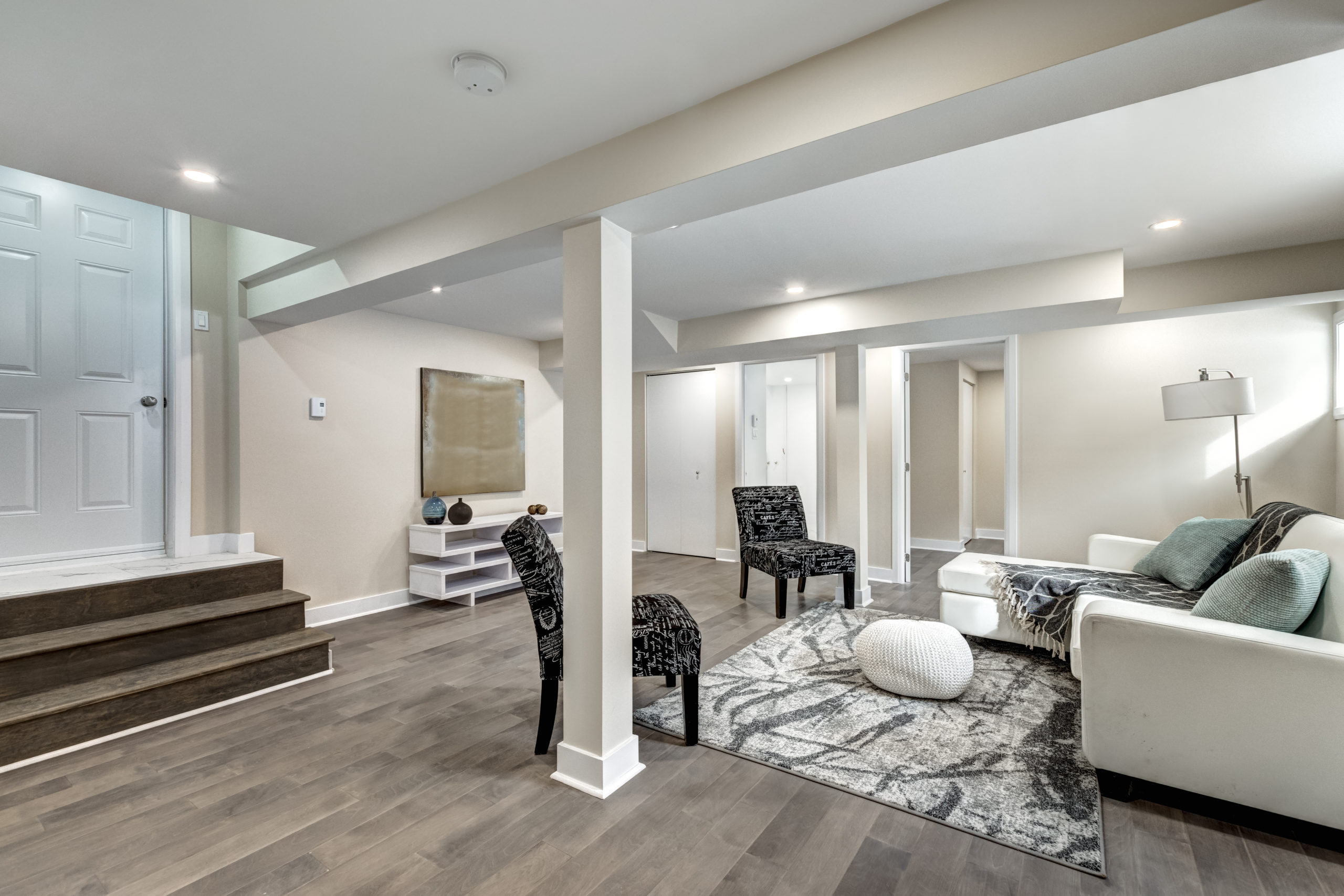
Photo: Flooring Stores
As a basement flooring option, vinyl is a top choice. There are three main types of vinyl available: vinyl sheets, vinyl tiles, and vinyl planks. There are several advantages associated with each variation. A seamless sheet of vinyl is impervious to water and creates a seamless surface.
Meanwhile, vinyl tiles have multiple seams that are vulnerable to long-term water infiltration. This risk can be minimized by ensuring that the product is installed properly. Planks made of vinyl work similarly. The product (vinyl) is 100% waterproof, but, the surrounding areas are not.
A luxury vinyl tile (LVT) or luxury vinyl flooring is more resilient than a conventional flooring option. Pieces of luxury vinyl are fitted together to form a floating surface above the subfloor. Their similar appearance to wood or stone is another distinctive characteristic of these products. SPC vinyl and WPC vinyl planks are called rigid core vinyl floors and these are also floating floors. This are also an excellent option for basements.
The advantages of floating floors over concrete subfloors include the fact that the floor can expand and contract as needed to accommodate changes in humidity and deal with the moisture in the concrete subfloor.
Flooring for Basements: Engineered Hardwood Flooring
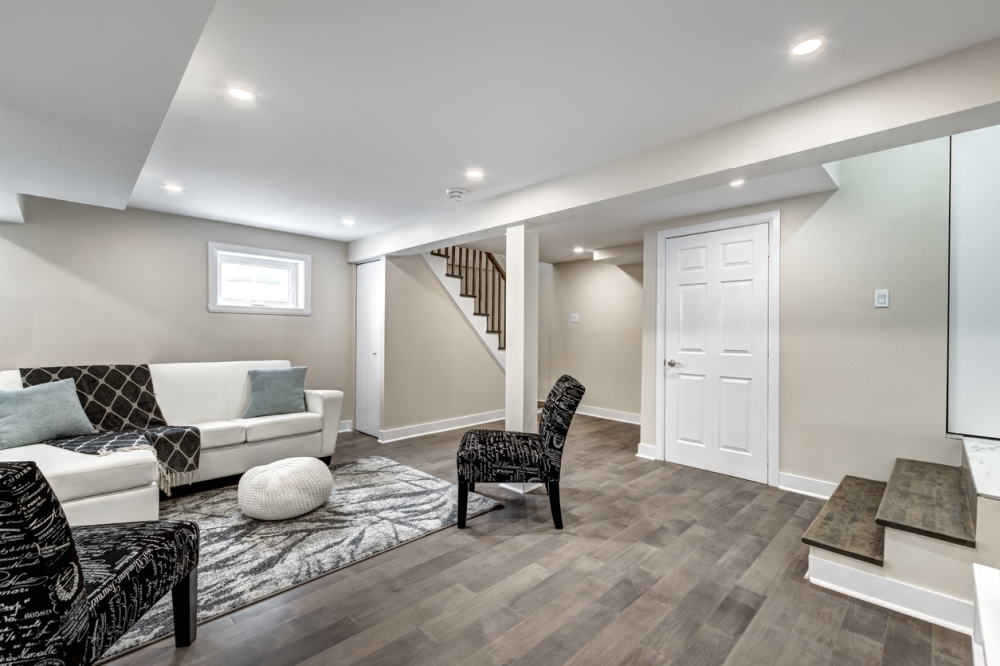
Photo: Homedit
If you want real wood, this is your option. Solid hardwood floors can not be installed below grade due to the fact that wood is an organic material, it cannot tolerate prolonged contact with water. Engineered hardwood is much more stable and can be installed below grade.. solid hardwood can not.
An engineered hardwood product is produced by using a hardwood veneer on top of a high quality plywood core. An engineered wood product has plywood cores with dimensional stability, making it acceptable in basements.
There is a whole class of building materials and products that are made from engineered wood. A composite product is constructed by combining real wood, shredded wood fibre, scrap wood, and/or sawdust with adhesives to produce a strong and durable product that looks and acts like wood.
Engineered hardwood floors is not our first choice to be used in basements, but it is an option. If you do not like vinyl and you are confident you'll be able to avoid any excessive moisture, then nothing beats the beauty of a real hardwood engineered floor.
Flooring for Basements: Ceramic or Porcelain Tile Flooring
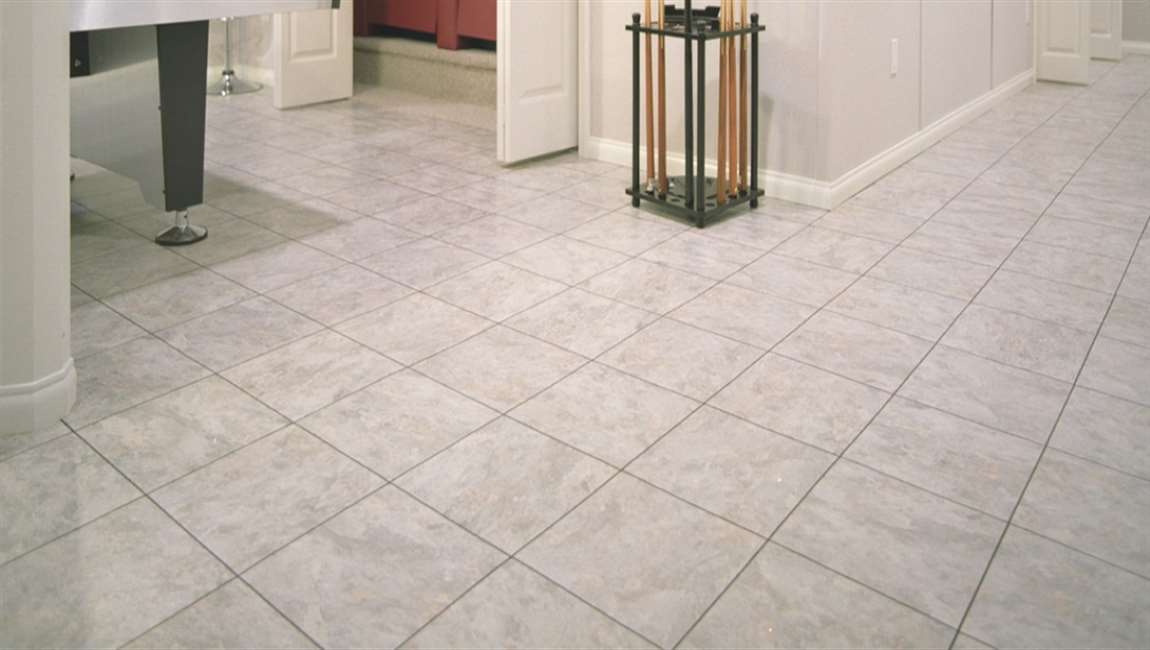
Photo: Barana Tiles
There are a number of benefits associated with tile flooring for basements. The surface is already finished with an attractive and moisture-resistant finish. Even if it is flooded, it simply dries out and does not suffer any damage.
Tiles can be installed directly on concrete if they are ceramic or porcelain (follow all manufacture and industry standard installation guidelines). A radiant heating system could be installed between the tile and concrete in order to enjoy a warmer surface. Especially if you intend to use the basement as an extension of your living area, tiles can be cold and uncomfortable to stand on. In spite of the fact that a tile can be installed directly on a concrete floor, an uncoupling membrane should be installed prior to the installation.
Uncoupling membranes serve as intermediates between tiles and substrates. As a result, the tile covering may not be damaged by shifting or cracking concrete. It is important to keep in mind, however, that it is not capable of preventing all types of cracks. The installation of tiles can be a challenging DIY project. Professional installation is recommended.
Flooring for Basements: Concrete Flooring
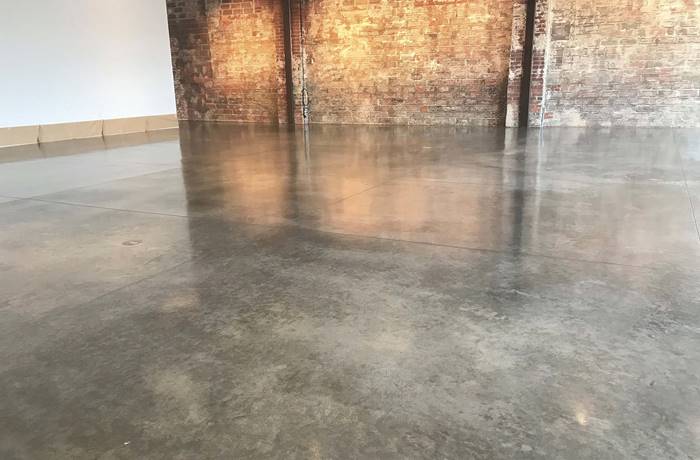
Photo: Concrete Decor Magazine
Although concrete is a utilitarian choice, its raw state can be altered. However, it is possible to paint or stain the surface in order to create a different look. Be sure to thoroughly clean it before painting. If you wish to prevent the growth of mould and mildew on your floor, you must cover it with moisture sealant.
It's unfortunate that concrete is the coldest flooring material and can't be heated. In the event that you intend to use the basement more frequently, you should take into account this disadvantage. In addition, the product does not perform well when it comes to sound absorption, which can adversely affect the sound quality of your entertainment system.
Flooring for Basements: Laminate Flooring
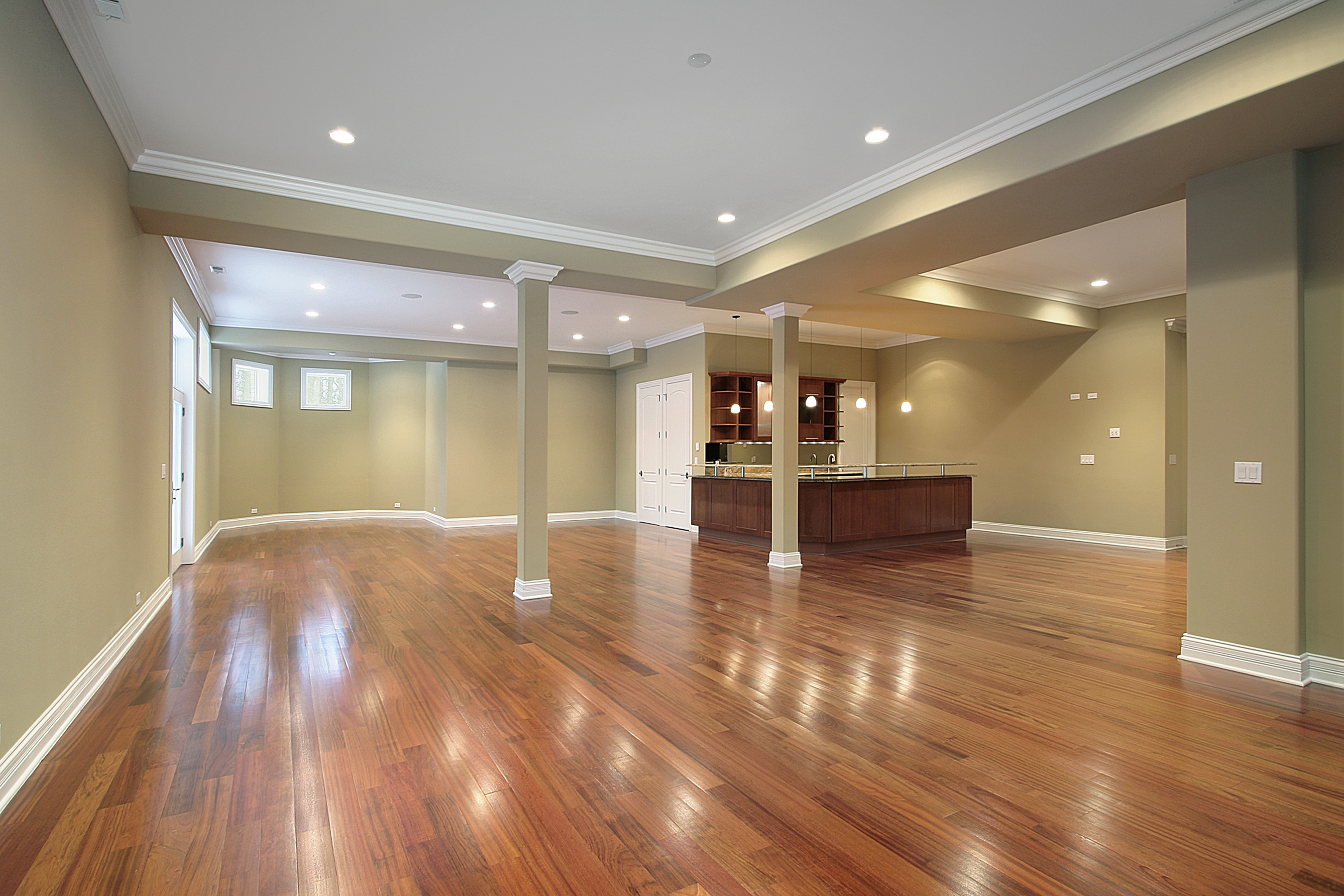
Photo: Continental Flooring
Homeowners have certainly become more accepting of laminate flooring due to improved image quality and textured surfaces. Laminate flooring is now so realistic it is very difficult to tell the difference between laminate flooring and real hardwood floors. Unfortunately, there are still moisture issues associated with it in high moisture environments. Laminate flooring's HDF fibreboard layer will swell up permanently if it is soaked in water for a prolonged period of time. Even after the flooring has dried completely, it will remain that way. It is also possible for the top layer to peel off due to the expansion of the material. Laminate flooring in vernal is what is referred to as water resistant. This means it can deal with spills, but, it is never 100% waterproof. Even marketing ads from some flooring companies that claim to have 100% waterproof laminate is suspect if the core is HDF. High density fibre board (HDF) is made from wood, and eventually, if long term exposure to water occurs the laminate floor will be negatively impacted.
So yes, it is possible to buy 'waterproof laminate' from certain brands. You may wish to discuss this option with your flooring professional to see if it suits your needs. This type of laminate flooring is great option, but you should consider waterproof laminate to mean 72 or 80 ours of water resistance, and after that, expect the product could be damaged. This segment of the laminate industry is growing rapidly, and the design options are expanding, although it has a slightly more restricted offering than regular laminate. The industry will continue to evolve, and eventually we suspect an actual 100% laminate may be created, so keep searching if a floating floor laminate flooring option is what you are really after.
Flooring for Basements: Rubber Flooring
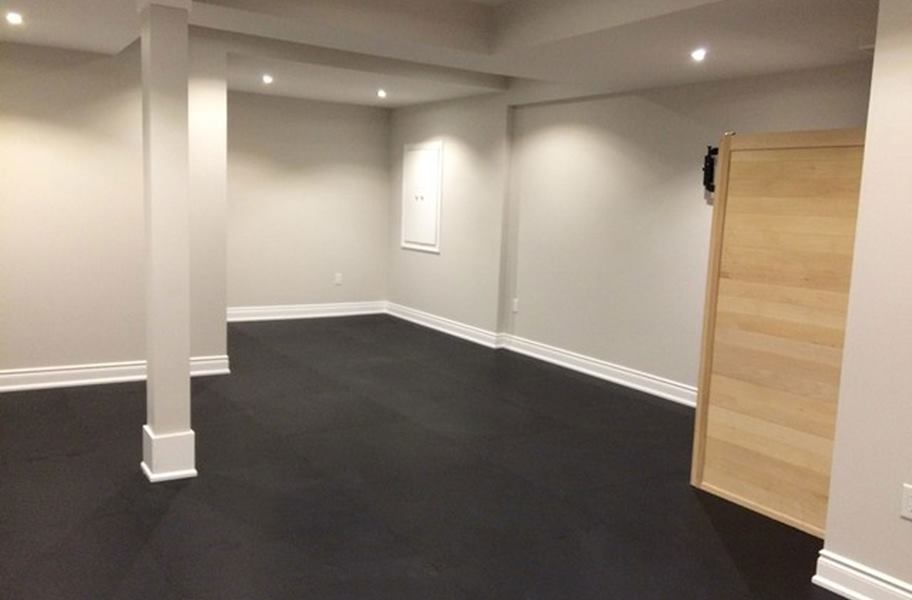
Photo: Flooring Inc
There are a lot of places where rubber flooring is used, such as fitness centers, playrooms, studios, or garages. Is this also suitable for basements?
It is recommended that you consider this type of flooring if your basement will only be used for recreation (for example, a child's play area). It is easier to install interlocking rubber tiles, however, there are more seams in them than in roll rubber. The rubber flooring provides cushioning for anything you drop and is resistant to sharp objects. Even though rubber does not grow rot, you should be mindful of the seams. In order to prevent potential water damage to the subfloor, it is vital to conduct regular inspections.
It is noteworthy that rubber flooring has a distinctive appearance in contrast to other flooring options, which are available in a variety of styles and finishes. There are many options for roll or tile rubber, including solid colours and multiple colours, but they still appear rather monotonous.
Flooring for Basements: Cork Flooring

Photo: Flooring Clarity
Walking on cork is a comfortable experience due to its soft underfoot. You may also find it useful if you wish to practice instruments in the basement because of its fair sound absorption qualities. Unfortunately, it is susceptible to deterioration. It is essential to lay a subfloor system prior to installing cork flooring in the basement. Be careful with cork flooring around water. Example: we do not recommend in a bathroom due to the regular high moisture exposure.
Frequently Asked Questions about Basements:
When should you install a basement subfloor?
By installing a subfloor, moisture can be reduced and the floor can be better insulated. It is strongly recommended that basement flooring such as carpet, cork, and laminate be installed on a subfloor.
Does the basement floor require the application of a moisture sealant?
It is possible to prevent damage to the basement as well as unpleasant odors by using moisture sealants. The best course of action is to take all possible preventive measures.
Other flooring blog articles you may want to read:
FACTORS TO CONSIDER BEFORE INSTALLING VINYL FLOOR
TWELVE OAKS FLOORS: DELIVERING EXCEPTIONAL FLOORS BECAUSE YOUR VALUE IS THEIR PROMISE
LAMINATE, VINYL, AND ENGINEERED HARDWOOD FLOORING OPTIONS: WHAT MAKES THEM DIFFERENT?
